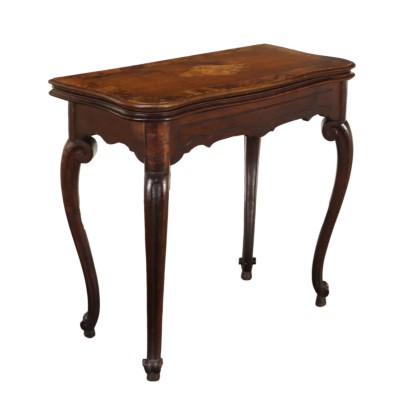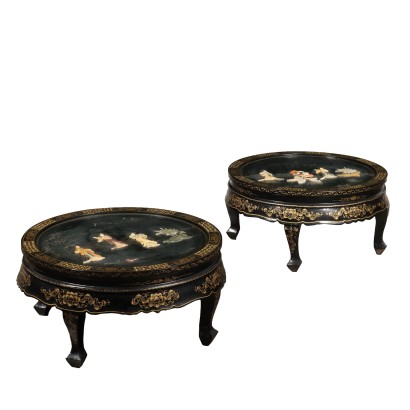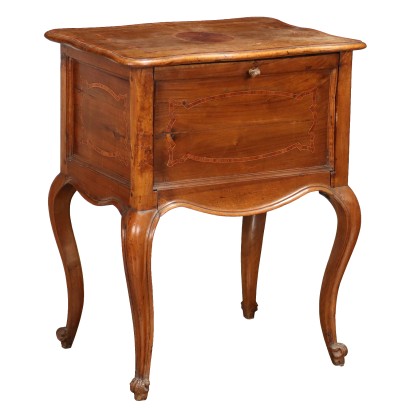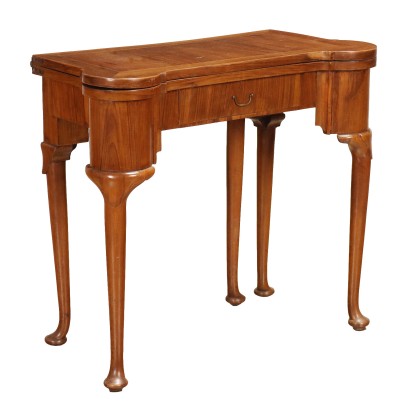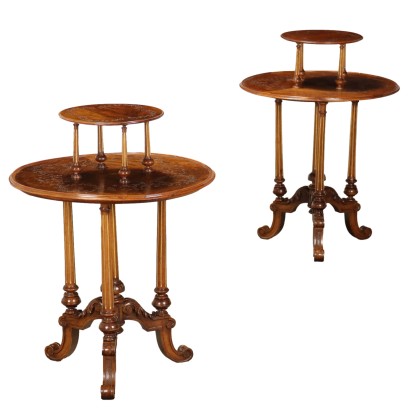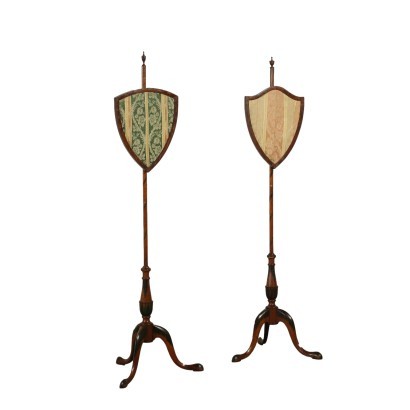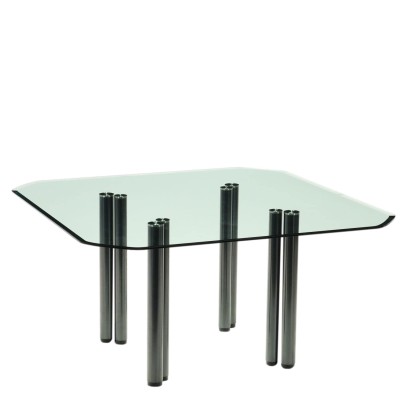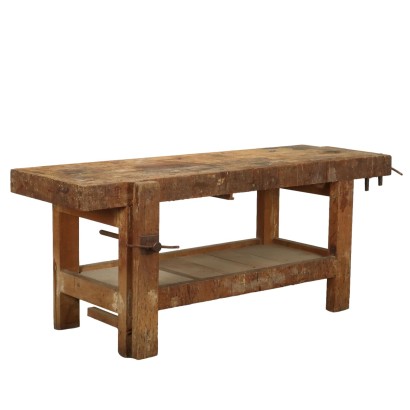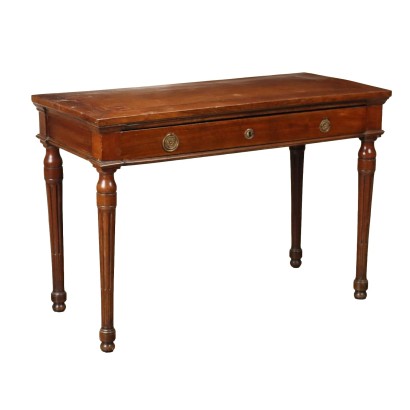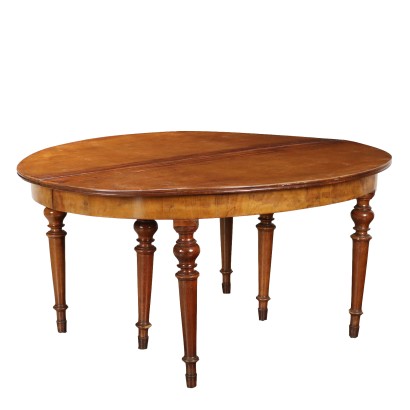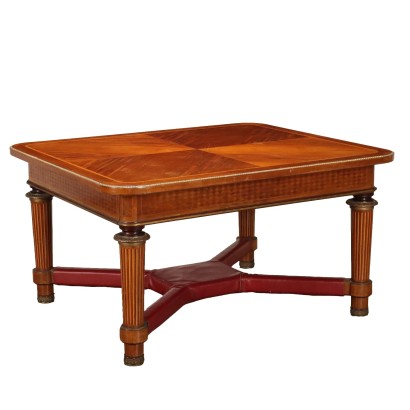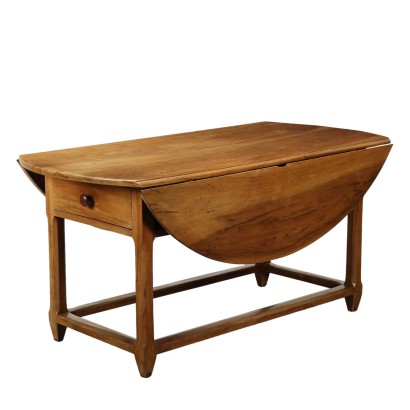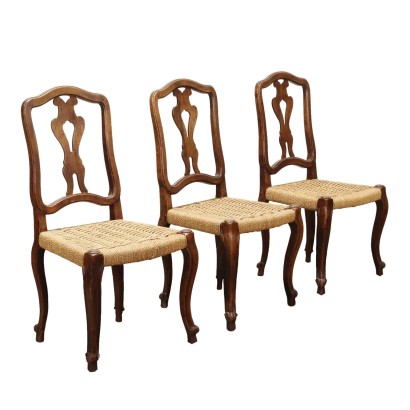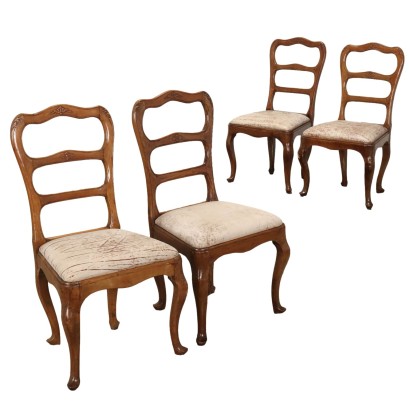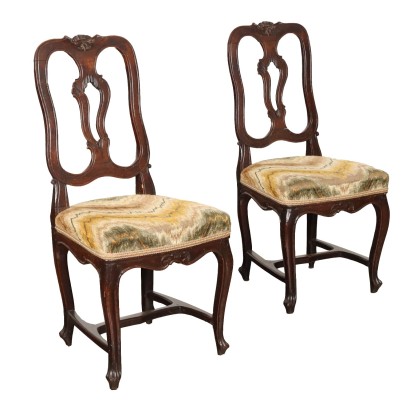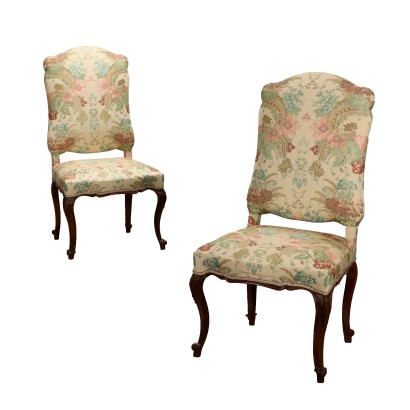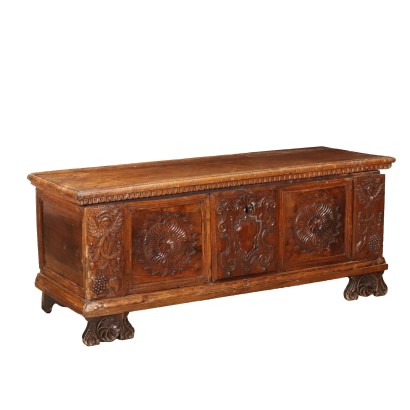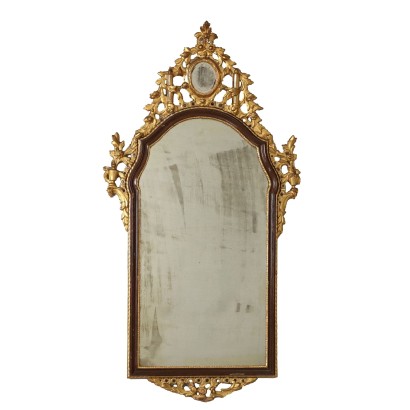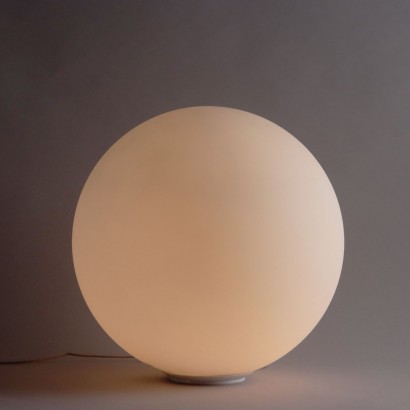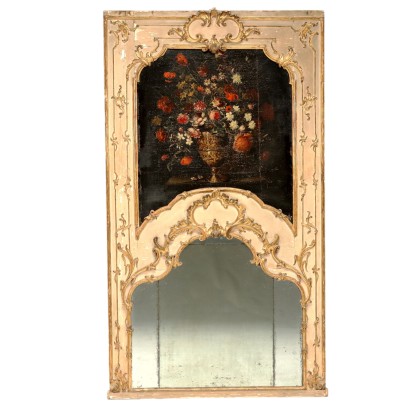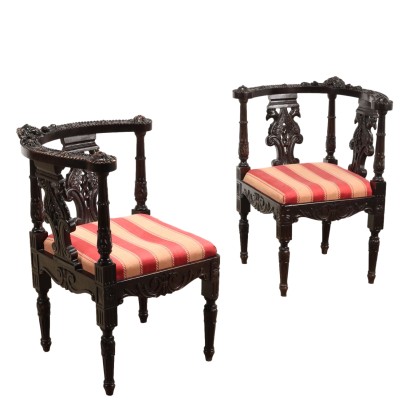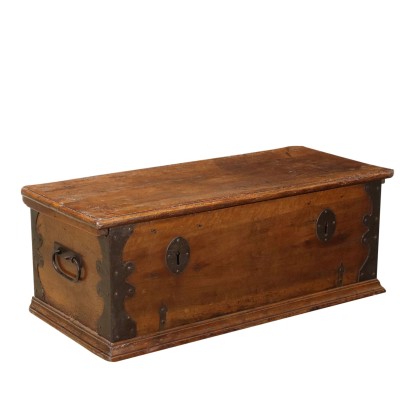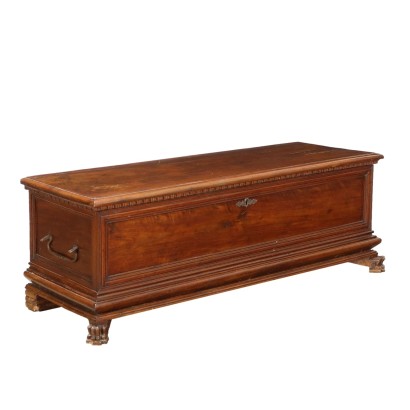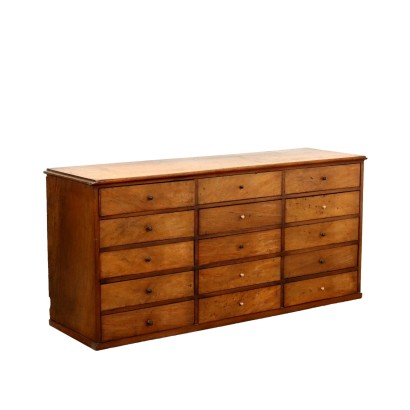Baroque Folding Table Walnut Italy XVIII Century - Emilia Terzo Quarto XVIII Century
Features
Emilia Terzo Quarto XVIII Century
Style: Barocchetto (1720-1770)
Age: 18th Century / 1701 - 1800
Origin: Emilia Romagna, Italy
Main essence: Maple , Walnut , Poplar
Material: Bronze , Poplar Burl
Description
Baroque folding table in walnut and poplar burl, Emilia third quarter of the 18th century. Openable top with central mirrored geometric design in poplar briar, maple thread and perimeter border in poplar briar, shaped and gouge-carved band, wavy fluted legs ending with curled feet. Bronze hinges.
Product Condition:
Product that due to age and wear requires restoration and resumption of polishing.
Dimensions (cm):
Height: 81
Width: 86
Depth: 42,5
Maximum size (cm):
Depth: 85
Additional Information
Style: Barocchetto (1720-1770)
With this term we designate, for what specifically relates to furniture, a part of the production carried out in Italy in the period of time between the Rococo era and the first phase of neoclassicism.It is characterized by the formal and decorative structure still rigidly adhering to the dictates dear to the Baroque period (hence the term baroque) and to the Louis XIV fashions and yet the new times are captured in the adoption of smaller volumes, more decorative modules. elegant, often directly inspired by French fashion, but always executed with rigorous principles of ornamental symmetry.
The tendency to assimilate formal and volumetric novelties but not to incorporate their ornamental elaboration finds natural explanation in Italy in the fact that in this century the great aristocracy experienced an unstoppable political and economic decline.
If in the previous century there was a great profusion of furnishings destined to adorn newly built homes, to proudly show the power of the client family, in the eighteenth century they rather take care to update the building with only the furniture strictly necessary for the new needs imposed by fashion or functional needs.
The old scenographic apparatus is maintained and the new must not contrast too much.
Find out more about the Barocchetto with our insights:
Classic Monday: discovering Barocchetto
Classic Monday: between Baroque and Barocchetto
Classic Monday elegant and unusual with two Barocchetto balustrades
FineArt: Pair of Barocchetto chairs, Venice
Emilian canterano first quarter XVIII century, first Barocchetto
Ribalta a urn, Milan mid-18th
Age: 18th Century / 1701 - 1800
18th Century / 1701 - 1800Main essence:
Maple
Hard, light wood used for inlays. It grows mainly in Austria, but it is widespread throughout the northern hemisphere, from Japan to North America, passing through China and Europe. It is one of the lightest woods ever, tending to white, it is similar to lime or birch wood. The briar is used in the production of ancient secretaires .Walnut
Walnut wood comes from the plant whose botanical name is juglans regia , probably originally from the East but very common in Europe. Light or dark brown in color, it is a hard wood with a beautiful grain, widely used in antique furniture. It was the main essence in Italy throughout the Renaissance and later had a good diffusion in Europe, especially in England, until the advent of mahogany. It was used for solid wood furniture and sometimes carvings and inlays, its only big limitation is that it suffers a lot from woodworm. In France it was widely used more than anything else in the provinces. In the second half of the eighteenth century its use decreased significantly because mahogany and other exotic woods were preferred.Poplar
Essence considered "poor", it is a white wood, with yellowish or greyish shades, light and tender, which is easily damaged. It is used for rustic furniture or in the construction of furniture. The most valuable use it has had in the history of furniture is in Germany, in the 19th century, for veneers and inlays in the Biedermeier period.Material:
Bronze
Poplar Burl
Other customers have searched:
Tavolini, tavolino antico..
Approfondimenti
Se ti interessano tavoli, tavolini, tavoli a vela, scrivanie, scrittoi e consolle dai un'occhiata ai nostri approfondimenti sul blog...
L'antiquariato dalla A alla Z: il Dizionario dell'Antiquariato
Il dizionario dell'antiquariato - Lastronatura
Il dizionario dell'antiquariato - Mascherone
Il dizionario dell'antiquariato - Natura morta
Il dizionario dell'antiquariato - Opificio
Il dizionario dell'antiquariato - Pastiglia
Il dizionario dell'antiquariato - Savonarola
Il dizionario dell'antiquariato - Rosone
Intaglio barocco con motivo a ricciolo
Sui tavoli:
Il Neobarocco in un grande tavolo dell'800
Il Tavolo a fratino
Sui tavolini:
Breve storia dei tavolini
Un tavolino impero lombardo: segno di egemonia politica
Il tavolino da gioco, questo sconosciuto
Il dizionario dell'antiquariato – tavolino a Commesso
...e alle presentazioni su FineArt
Tavoli antichi:
Tavolo campionario lapideo, Roma, Opificio Raffaelli
Tavolo a vela, attribuibile a Luigi e Angiolo Falcini
Tavolo attribuibile a Luigi e Angiolo Falcini
Gueridon, Regno delle Due Sicilie, primo quarto XIX secolo
Tavoli modernariato e design:
Archivio Borsani, patrimonio di memorie e saperi
Tavolo anni '40 ABV
Tavolo Mario Vender Anni '60
Tavolo anni '50 ABV
Tavolo '522' Gianfranco Frattini per Bernini
Tavolo 'Barium' Luciano Frigerio
Tavolo anni '50, Manifattura Italiana
Tavolini antichi:
Coppia di tavolini Tomaso Buzzi, attribuiti
Tavolino da gioco, Bottega Giuseppe Maggiolini, inizi XIX secolo
Tavolini modernariato:
Tavolino anni '50
Tavolino anni '40 ABV
Approfondimenti
Se ti interessano tavoli, tavolini, tavoli a vela, scrivanie, scrittoi e consolle dai un'occhiata ai nostri approfondimenti sul blog...L'antiquariato dalla A alla Z: il Dizionario dell'Antiquariato
Il dizionario dell'antiquariato - Lastronatura
Il dizionario dell'antiquariato - Mascherone
Il dizionario dell'antiquariato - Natura morta
Il dizionario dell'antiquariato - Opificio
Il dizionario dell'antiquariato - Pastiglia
Il dizionario dell'antiquariato - Savonarola
Il dizionario dell'antiquariato - Rosone
Intaglio barocco con motivo a ricciolo
Sui tavoli:
Il Neobarocco in un grande tavolo dell'800
Il Tavolo a fratino
Sui tavolini:
Breve storia dei tavolini
Un tavolino impero lombardo: segno di egemonia politica
Il tavolino da gioco, questo sconosciuto
Il dizionario dell'antiquariato – tavolino a Commesso
...e alle presentazioni su FineArt
Tavoli antichi:
Tavolo campionario lapideo, Roma, Opificio Raffaelli
Tavolo a vela, attribuibile a Luigi e Angiolo Falcini
Tavolo attribuibile a Luigi e Angiolo Falcini
Gueridon, Regno delle Due Sicilie, primo quarto XIX secolo
Tavoli modernariato e design:
Archivio Borsani, patrimonio di memorie e saperi
Tavolo anni '40 ABV
Tavolo Mario Vender Anni '60
Tavolo anni '50 ABV
Tavolo '522' Gianfranco Frattini per Bernini
Tavolo 'Barium' Luciano Frigerio
Tavolo anni '50, Manifattura Italiana
Tavolini antichi:
Coppia di tavolini Tomaso Buzzi, attribuiti
Tavolino da gioco, Bottega Giuseppe Maggiolini, inizi XIX secolo
Tavolini modernariato:
Tavolino anni '50
Tavolino anni '40 ABV
Product availability
The product can be seen at Cambiago
Disponibilità immediata
Pronto per la consegna in 2 giorni lavorativi dalla conferma dell'ordine del prodotto.
Consegna tra i 7 e i 15 giorni in tutta Italia. Per le isole e le zone difficilmente raggiungibili i tempi di consegna possono variare.



